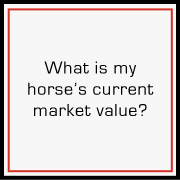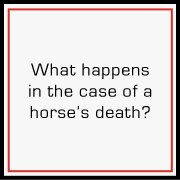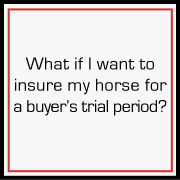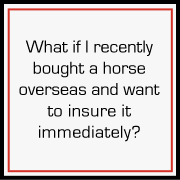There are myriad of options out there to decide between, so doing some homework and making sure that you’re getting what you—and your horse—need is critical.
What is my horse’s current market value?
All mortality insurance policies are based on what the insurance company deems your horse’s “current market value” to be. If you’ve recently purchased your horse, it’s easy to establish that value at the price you paid.
But, there are other situations that require more evidence. You can insure up to your horse’s current market value but you can also choose a mortality policy for any amount under that value as well.
If you’ve bought a horse cheaply as a training prospect, keep your agent informed as to its level of training and show record. Your horse’s value can change multiple times in the course of a year, if his record and training warrant an increase in the current market value.
If your horse doesn’t have a purchase price—let’s say you bred him or he was given to you—your insurance agent will ask detailed questions to help establish his market value.
Back to Top
What are exclusions?
If your horse has a known physical problem, such as a history of colic episodes or a suspensory desmitis, the underwriting insurance company might choose to exclude that pre-existing condition, meaning that they would not include that problem in your coverage. Sometimes no veterinary exam is necessary to begin an insurance policy, but it’s important to be honest about your horse’s medical history.
Not all exclusions are permanent, so keep your agent informed on your horse’s health.
Back to Top
When do I need to call my insurance agent?
If you have your veterinarian out for any reason other than routine maintenance (wellness exam, vaccinations, etc.), even if you think the incident is minor, you need to notify your insurance company. We have 24-hour notification services. But in an emergency, the veterinarian always gets the first call.
Back to Top
What happens in the case of a horse’s death?
You need to notify your insurance company promptly in the event of the death of your horse. Do not dispose of the horse until an adjuster agrees. The owner, not the insurance policy, pays for the necropsy. Many veterinary teaching hospitals and state departments of agriculture perform this service.
Back to Top
What if I want to insure my horse for a buyer’s trial period?
If you’re sending your horse out on a trial to a potential buyer, it’s possible to buy a short-term insurance policy—either mortality or mortality and major medical and surgical—for the period of time he’ll be elsewhere. If your horse is already insured, his policy will still cover him while he’s in someone else’s care (this applies only within the U.S. and Canada, unless you have territorial limits).
Back to Top
What if I recently bought a horse overseas and want to insure it immediately?
Contact an insurance agent—they can help you write a policy that covers your horse from time of purchase, while overseas, the transit, as well as coverage in the U.S. and Canada.
Back to Top
What if my horse is competing abroad?
Most insurance policies extend coverage only if the horse is in the U.S. or Canada, but your agent can help you choose a plan to extend that coverage to an international trip if you need.
Back to Top
What specialized policies are there?
You can insure a mare and foal during her pregnancy and foaling with expected foal insurance, which starts 42 days after the last cover date, or with guaranteed live foal insurance, which begins at the first cover date. There is also infertility insurance, and loss of use insurance, which covers the loss in value if a performance horse loses the ability to compete. Loss of use insurance involves proof of value and includes a veterinary exam.
So, if you cannot afford to replace your horse in the event of a loss, or even more important for many of us, if you cannot afford the costs of veterinary care in the event your horse suffers a serious illness or injury, insurance can be a cost-effective way to mitigate your risk. For many of us, our horses are best friends and family, and we absolutely do not want to be in a situation where financial considerations dictate the quality of care that we’re able to provide.
Or, even if you have the funds on hand to absorb these losses, you may still choose to invest a much smaller amount each year on insurance premiums so that you are not forced to tap into your savings if the unexpected happens.
And most importantly, find an agent who is also an experienced horse person-someone who knows combined driving from combined training as well as a hock from a hole in the ground. You want someone who understands your passion.
“Your coverage is as good as your agent.”
Talk to a THIS Agent. Contact us.








